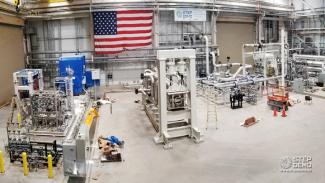A 10-megawatt supercritical carbon dioxide (sCO2) test facility recently achieved supercritical CO2 conditions in its turbine compressor section — a milestone representing a significant step forward in the NETL-sponsored project, which offers a path to lower-cost power generation.
The objectives of this award, which commenced in October 2016, include demonstrating the operability of the supercritical carbon dioxide (sCO2) power cycle, verifying the performance of components (turbomachinery, recuperators, and compressors, etc.), showing the potential for producing a lower cost of electricity in relevant applications, and demonstrating the potential and pathway for a thermodynamic cycle efficiency greater than 50 percent.
These goals are being accomplished through the design, construction and operation of the Supercritical Transformational Electric Power (STEP) pilot plant housed at the Southwest Research Institute’s (SwRI) San Antonio, Texas, site. The project led by Gas Technology Institute, with additional development from General Electric and SwRI, is the world’s largest indirect-fired sCO2 power cycle test facility. Federal funding of more than $113 million and project support from NETL has facilitated the maturation of this technology.
Turbines need a working fluid to transfer energy to their blades so they can spin and produce electricity. Traditional power plants have long used steam as the working fluid, but under specific conditions, CO2 can also be used. When CO2 is held above a critical temperature and pressure, it attains a supercritical state. The supercritical CO2 then acts like a gas while having the density of a liquid, resulting in increased efficiency, lower cost of electricity, reduced customer costs and reduced water consumption.
This technology is expected to enable smaller turbomachinery, which could be one-tenth the size of conventional power plant components. For example, a single desk-sized sCO2 turbine could potentially power 10,000 homes, creating a new generation of power plants that will use less fuel, produce fewer greenhouse gas emissions and require less space. An sCO2 power cycle is also very flexible, making it well-suited for integrating with renewable energy sources.
“Operating at supercritical conditions was a significant advancement of this project,” said NETL’s Seth Lawson, a federal project manager with the Hydrogen with Carbon Management team at NETL. “To date, most major equipment, including process piping, required for simple cycle commissioning and testing up to 500 degrees Celsius and 5 MWe has been delivered and installed. Once the plant is fully operational, it will serve as a test bed to enable optimization of system performance and development of critical components and subsystems.”
The STEP facility will also provide an opportunity for industry and government to work together to develop and mature the technology at the pilot-scale to facilitate commercialization. Investment made on this technology will spur the development of necessary designs, materials, components, operation and control systems, sensors, and the understanding and characterization needed for commercial acceptance of large-scale sCO2 power cycles.
“This achievement marks another of the key equipment and process advancements made in the project over the last year,” Lawson said. “Continued success in this project will bring us closer to the goal of the STEP program — pilot testing and demonstration of the sCO2 power cycle. Furthermore, NETL’s investment in this technology through this facility will enable the U.S. to lead development and commercialization of sCO2 technology and help achieve a decarbonized energy future.”
NETL is a U.S. Department of Energy national laboratory that drives innovation and delivers technological solutions for an environmentally sustainable and prosperous energy future. By leveraging its world-class talent and research facilities, NETL is ensuring affordable, abundant and reliable energy that drives a robust economy and national security, while developing technologies to manage carbon across the full life cycle, enabling environmental sustainability for all Americans.




